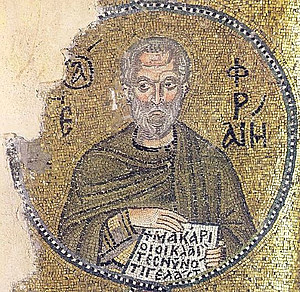Ephraem the Syrian
E. was born in Nisibis and was a student to Bishop Jacob in that town. He (apparently) had the rank of deacon. In 363, when Nisibis fell to the Persians, E. left for Edessa, where he cared for refugees fleeing Persian rule. He taught in a school there and was a key participant in dogmatic controversies, the same which were affecting the rest of the 4th century Roman-controlled world. Admired by Greeks and honored by Syrians even in his lifetime, he died in 373.
E.’s works survive mostly in Syrian and some in Armenian translation. Greek translations exist but are badly corrupted, and the collections contain many spurious writings. I. Poetry: A) Madrasha (hymns): Already used by Bardaisan and Mani, over 400, among them on Faith (87), Against Her, Paradise (15), Against Julian, Nativ, Epiph, Church + Virg (52), Carmina Nisibena (77), Fasting, Unleavened Bread, Crucifixion, Resurrection, Abraham, Juliana. B) Memre (seven-syllable couplets): On Faith, On Destruction of Nicomedia, On our Lord. II. Prose: A) Refutations (Marcion, Bardaisan, Mani) B) Commentaries OT (Gen-Ex) NT (Acts, Paul, Diatessaron). C) Artistic Prose (Discourse on our Lord, Letter to Publius).
He left behind several exegetical works on the OT but a commentary on the Diatessaron (a blending of the four gospels into one by Tatian from the second century) is fragmentary. E. composed a scathing critique of Mani, Marcion, and Bardesanes in his Refutations. This, along with his skillful letters and homilies, are his prose works. He is best known, however for his poetic theology. Syrian meter reached a high point in his writings. He composed metrical homilies, didactic hymns (composed to be sung to the lay people by a choir), hymns against heresies (Hymni contra haereses, Carmina Nisibena) which deals with eschatology and Christ’s victory over death especially, 87 hymns about the faith (Hymni de fide), and hymns about the church, against Julian, and liturgical hymns
E. chastised the heretics—especially the three Syrian heresiarchs Bardesanes, Mani, and Marcion as well as Arius and his followers—for becoming puffed up in their knowledge, relying too much on reason and Greek philosophy to understand God. Instead, God can only be known through symbol and picture. God is only properly spoken of through the medium of Scriptural testimony and the figurative language therein and nature. E.’s anti-rationalism allowed him to connect with the congregation by means of song—his orthodox theology permeates his hymns and poems. Jewish rabbinic influence is evident in some of E.’s works.
While he was the most luminous of the orthodox Syrians, his influence is not limited only to that locality and the language used there. His theology was referenced by churches in both the East and West as authoritative. In De viris illustribus, Jerome pays him homage, reporting that his words were read in church. The Roman Catholic Church recognized him as a doctor in 1920.
